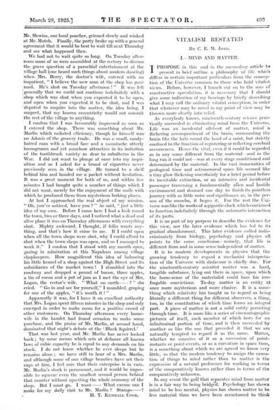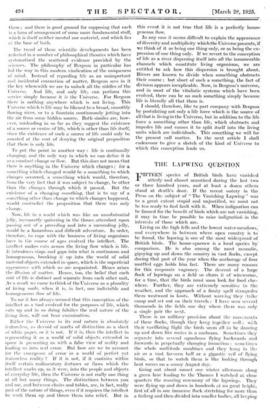VITALISM RESTATED
BY C. E. M. Joan.
1.—MIND AND MATTER.
IPROPOSE in this and in the succeeding article to present in brief outline a philosophy of life which differs in certain important particulars from the concep- tion of the Universe common to those who hold vitalist views. Before, however, I launch out on to the seas of constructive speculation, it is necessary that I should give some indication of my bearings by briefly describing what I may call the ordinary vitalist conception, in order that whatever may be novel in my point of view may be thrown more clearly into relief.
As everybody knows, nineteenth-century science prac- tically succeeded in eliminating mind from the Universe. Life was an incidental offshoot of matter, mind a flickering accompaniment of the brain, surrounding the brain like the halo round the head of a saint, but strictly confined to the function of registering or reflecting cerebral occurrences. Hence the vital, even if it could be regarded as in any sense different from the material—and in the long run it could not—was at every stage conditioned and determined by the material. In the vast immensities of geological time and astronomical space life seemed like a tiny glow flickering uncertainly for a brief period before its inevitable extinction, or an intrusive and incidental passenger traversing a fundamentally alien and hostile environment and doomed one day to finish its pointless journey with as little noise and significance as, in the per- son of the amoeba, it began it. For the rest the Uni- verse was like the works of a gigantic clock which continued to function indefinitely through the automatic interaction of its parts.
It is no part of my purpose to describe the evidence for this view, nor the later evidence which has led to its gradual abandonment. This later evidence culled indis- criminately from biology, psychology and physics all points to the same conclusion—namely, that life is different from and in some sense independent of matter.
It is to modern developments in physics that the growing tendency to regard a mechanist interpreta- tion of the Universe with disfavour is chiefly due. For the nineteenth-century scientist matter was a hard, tangible substance, lying out there in space, upon which the horse-sense of the materialist could base his irre- fragable convictions. To-day matter is an entity at once more mysterious and more elusive. It is a some- thing which relativity has taught us to regard as being literally a different thing for different observers, a thing, too, in the constitution of which time forms an integral part. A piece of matter is not a solid entity persisting through time. It is more like a series of cinematographic pictures of itself, each member of which lasts for an infinitesimal portion of time, and is then succeeded by another so like the one that preceded it that we are naturally tempted to regard it as the same. Matter, whether we conceive of it as a succession of point- instants or point-events, or as a curvature in space time, is a something about which we arc agreed we know very little, so that the modern tendency to assign the causa- tion of things to mind rather than to matter is the expression of a natural preference for working in terms of the comparatively known rather than in terms of the comparatively unknown.
In any event the gulf that separates mind from matter is in a fair way to being bridged. Psychology las shown mind to be less mental, physics has shown matter to be less material than we have been accustomed to think them ; and there is good ground for supposing that each is a form of arrangement of some more fundamental stuff, which is itself neither mental nor material, and which lies at the base of both.
The trend of- these scientific developments has been reflected in a number of philosophical theories which have systematized the scattered evidence provided by the - sciences. The philosophy of Bergson in particular has led the way in this modern vindication of the uniqueness of mind. Instead of regarding life as an unimportant and incidental emanation of matter, Bergson sees in it the key wherewith we are to unlock all the riddles of the Universe. And life, and only life, can perform this service simply because it is the Universe. For Bergson there is nothing anywhere which is not living. This Universe which is life may be likened to a broad, smoothly flowing river, or to a fountain continuously jetting into the air from some hidden source. Both similes arc, how- ever, misleading in so far as they suggest the existence of a source or centre of life, which is other than life itself, since the existence of such a source of life could only be asserted at the cost -of denying the original proposition that there is only life. • • To put the point in another way : life is continually changing, and the only way in which we can define it is as a constant change or flow. But this does not mean that there is anything in the Universe which changes ; for a something which changed would be a something to which changes occurred, a something which would, therefore, from the very fact that it was subject to change, be other than the changes through which it passed. But the existence of a changing something, that is to say. of a: somethingOther than change to Which changes happened, would contradict the proposition that there was only change. .
Now, life in a. world which was like an unsubstantial- jelly, incessantly quivering in the throes attendant upon passing out of a preceding and into a succeeding jellY, would be a hazardous and-difficult -adventure.. In order,. therefore, to cope with the business of living organisms- have in the course of ages evolved the intellect. The intellect makes cuts across the living flow which is life. It introduces stops and gaps into what is continuous and homogeneous, breaking it up into the world of solid material objects extended in space; which is the superficial appearance with which we arc acquainted. Hence arises the illusion of matter. Hence, too, the belief that each' unit of life is distinct and separate from each other unit. As a result we came to think of the Universe as a plurality of living souls, -when it is, in fact, one indivisible and homogeneous flow of life.
To me it has always seemed that this conception of the intellect as a tool evolved for the purposes of life, which- cuts up and in so doing falsifies the real nature of- the living flow, will not bear examination.
Either the Universe in its real nature is absolutely featureless, as devoid of marks of distinction as a. sheet of white paper, or it is not. If it is, then the intellect in representing it as a world of solid objects extended in space is presenting us with a false view of reality and leading us into real error. But how are we to account for the emergence of error in a world of perfect yet featureless reality ? If it is not, if it contains within itself certain rudimentary features or flaws which the intellect works up, as it were, into the people and objects of everyday life, then the Universe is not really one thing at all but many things. The distinctions between you and me, and between chairs and tables, are, in fact, really part of the nature of things, even if it requires the intellect to work them up and throw them into relief. But in this event it is not true that life is a perfectly homo- geneous flow.
In any case it seems difficult to explain the appearance. of diversity and multiplicity which the Universe presents, if we think of it as being one thing only, or as being the ex- pression of one thing only. If we revert to the conception of life as a river dispersing itself into all the innumerable. channels which constitute living organisms, we are entitled to ask how this dispersion is brought about. Rivers are known to divide when something obstructs their course ; but short of such a something, the fact of division appears inexplicable. Now, in Bergson's universe, and in most of the vitalistic systems which have been evolved, there can be no such something simply because. life is literally all that there is.
I should, therefore, like to part company with Bergson by postulating not only a life force which is the source of all that is living in the Universe, but in addition to the life force a something other than life, which obstructs and impedes life and causes it to split itself into the living units which are individuals. This something we will for. the present call matter. In the next article I shall endeavour to give a sketch of the kind of Universe to which this conception leads us.















































 Previous page
Previous page